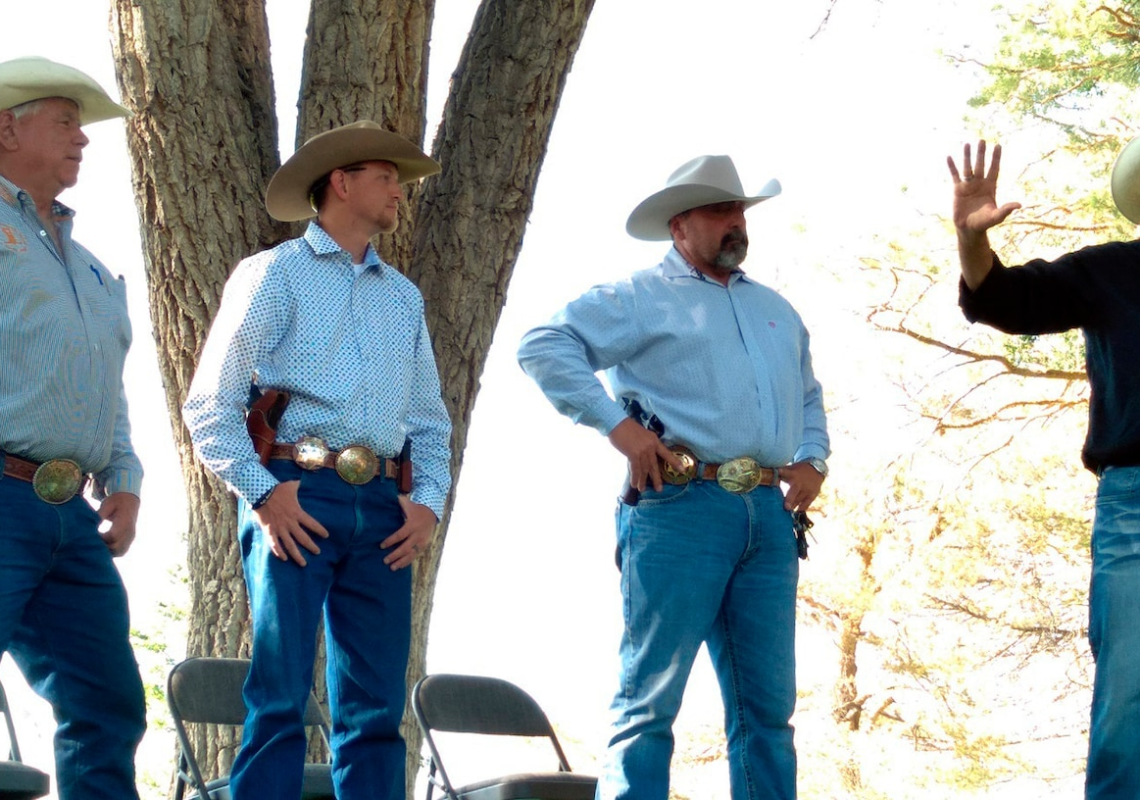Police reform initiatives launched after George Floyd’s murder have largely overlooked the nation’s more than 3,000 county sheriffs, most of them elected. Yet there is an urgent need to address how sheriffs are increasingly undermining law enforcement accountability — and distorting public policy more broadly.
Of particular concern are the self-styled “constitutional sheriffs” — an increasingly influential subset of sheriffs who are subverting not only reform efforts but also core democratic principles.
Constitutional sheriffs assert they have the power not only to enforce the law but to be the ultimate arbiters of what the law is in their counties. Contending that this authority supersedes that of all other government officials — including state governors and the president — they refuse to enforce a range of public safety laws, from local mask mandates to state and federal gun laws.
These sheriffs base this claim to power on their oath to uphold the Constitution. (Although even the National Sheriffs’ Association notes that this oath is taken by every law enforcement officer and confers no special authority on sheriffs.) If their assertion brings to mind the anti-government, militia-supporting Oath Keepers organization, you are on the right track. Richard Mack, founder of the Constitutional Sheriffs and Peace Officers Association, was a longtime board member of the Oath Keepers, and the constitutional sheriff idea has explicitly white supremacist roots. Given that Mack has called the federal government “the greatest threat we face today,” it is no surprise that constitutional sheriffs have expressed support for the Jan. 6 insurgents. And it is completely on brand that the 2016 CSPOA “sheriff of the year” tried to recruit other constitutional sheriffs to help him seize Dominion voting machines in 2020.
Boosted by the pandemic, ‘constitutional sheriffs’ are a political force
Every believer in democracy should find it chilling that the CSPOA counts “several hundred” sheriffs as dues-paying members and hundreds of other sheriffs as supporters. The Center for Public Integrity reported five years ago that Mack had already trained more than 400 sheriffs in “how to interpret the Constitution and how to resist authorities and laws that violate it.” These numbers are almost certainly higher now and rising: Mack has continued to train, and both Montana and Texas this year approved official training events, led by Mack, to teach constitutional sheriff tenets to law enforcement personnel.
Sheriffs resisting police reform efforts, whether or not they are part of the constitutional sheriff movement, have cited its false tenets. These assertions are often accepted by lawmakers without challenge — thus moving anti-government and racist ideas from the fringe to the policymaking mainstream. Take the example of Virginia, where in 2020 the state legislature passed a law allowing local governments to establish civilian oversight of police departments. But legislators caved to Virginia Sheriffs’ Association assertions that the new oversight could not apply to sheriffs because sheriffs are “elected constitutional officers.”
This farcical argument flies in the face of decades of civilian oversight of elected sheriffs. After searching in vain for any legal basis for sheriff supremacy and checking with several others who have studied law enforcement and civilian oversight, I can confirm that a constitutional sheriff with unique autonomy is not actually a thing. It appears that, as one state official told me, the Virginia lawmakers just did not want to take on a political battle with sheriffs — known to be a combative bunch. And just like that, an extremist, once-fringe movement significantly constrained law enforcement oversight for an entire state.
Cedric L. Alexander: Why reforming qualified immunity will never resolve police violence
Sheriffs closer to the mainstream have also played a role in undermining police accountability. For example, as Congress worked toward federal police reform legislation this year, Democratic negotiators made substantial compromises to get major organizations, including the Fraternal Order of Police, on board. But the Republican lead on the bill, Sen. Tim Scott (S.C.), refused to agree to anything that didn’t have the support of the National Sheriffs’ Association, the largest sheriffs association in the country. When the sheriffs could not be persuaded — that was that. (Scott said reform talks had collapsed because Democrats supported “defunding the police,” but the FOP and International Association of Chiefs of Police publicly disputed that characterization.) Still, mainstream is a relative term: Thirteen sheriffs in Scott’s 46-county home state have been convicted of criminal charges in the past 11 years, and one of the National Sheriffs’ Association’s new executive members, Chris West of Oklahoma, was at the Capitol on Jan. 6.
To protect communities from abusive policing and our democracy from extremists within law enforcement, we must push back on assertions by sheriffs that they are above the law. That may mean changing state laws so that sheriffs are appointed rather than elected, because appointed officials can be more quickly removed for extremist behavior, and the electoral process has not been effective at holding sheriffs accountable. It certainly means passing laws that make sheriffs just as accountable to democratic governance as any other law enforcement officer.
The most important news stories of the day, curated by Post editors and delivered every morning.
By signing up you agree to our Terms of Use and Privacy Policy






